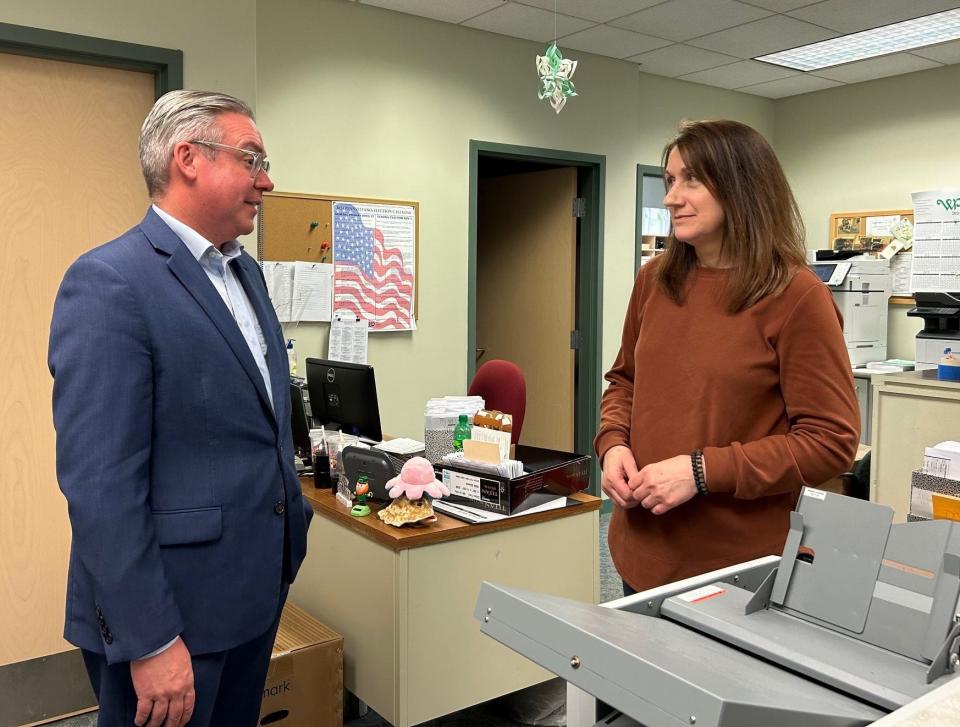How does Pa. ensure free, fair elections? Lawmakers, red and blue, count the ways
At a time when America's confidence in the state of our elections and democracy has significantly eroded, we, as the bipartisan Pennsylvania board members of the Democracy Defense Project, are working to bolster the public's faith in the integrity of our election system. That's why we recently met with Pennsylvania's Secretary of the Commonwealth, Al Schmidt, who is charged with oversight of the state's elections. We participated in an informative and detailed discussion on Pennsylvania's processes for administering elections.
The biggest takeaway for us was that all voters in the commonwealth can have confidence in our election system when they cast their ballots. The Department of State is a partner with the state's county election offices to ensure elections run smoothly. The secretary's office regularly maintains contact with each county election office in the lead-up to Election Day to ensure they have the necessary tools and resources. The department also conducts training to help new election directors succeed in their first year on the job. In the event that issues or irregularities do arise, the department operates a hotline for voters to report issues of concern, with the department's staff at the ready to investigate.

While only about 1.2% of all mail-in ballots have been rejected for various errors, Secretary Schmidt is committed to improve that rate. To clarify the procedure, mail-in ballots were redesigned to reduce voter error due to missing items, such as the secrecy envelope, the proper date, or a voter signature. This redesign drastically reduced the number of rejected mail-in ballots in April's primary elections and the department is seeking to further reduce that number for the general election.
Sec. Al Schmidt: How Pa. is working to ensure free, fair, safe and secure elections
Our discussion also addressed misinformation that creates unnecessary challenges for election administrators, especially surrounding two issues: noncitizen voting and the tabulation of mail-in ballots.
Secretary Schmidt worked with PennDOT to create a system that would flag noncitizen driver's license numbers to ensure that the option to register via the PennDOT process is not available to them. In the unlikely event a noncitizen were able to register to vote, the SURE voter system would reject their application.
As for counting mail-in ballots, current law dictates that ballots cannot begin to be counted until the polls open at 7 a.m. on Election Day. That can extend the ballot count well beyond election night in certain counties. The secretary emphasized that this is normal and expected; it does not signal that something nefarious is occurring. He has, however, testified before the General Assembly urging members to change the law to allow the pre-canvassing or counting of these ballots to commence earlier. We strongly support his recommendation.

The law (Act 77) allowing "no-excuse" mail-in ballots made many changes, however, it failed to address some items that are important to the process. It was silent on the county election boards' choices to notify voters to cure, or correct, incorrectly filled out ballots, as well as on the use and monitoring of drop boxes, leaving each county to develop its own plans. To create uniformity, the secretary has issued guidance to counties for pre-election voter contact and cure ballot procedures. The department has also issued recommendations on how to manage drop boxes, including having round-the-clock security surveillance with access to recordings and having drop boxes secured and not moveable. While the secretary has done everything in his power to provide guidance and directives to Pennsylvania counties to promote uniformity, the legislature holds the power to truly change and clarify the rules by which our elections are administered. We believe the General Assembly should continue to work to provide uniformity and simplicity to our election laws and to be clear about the legality of ballot curing and drop boxes.
More: What could trigger costly, time-consuming election recounts in Pa.? 3 signatures and $50
We are thankful, and voters should be confident that we have public servants who work every day to keep our elections free and fair.
Democracy Defense Project Pennsylvania works to defend the transparency, safety, security and validity of Pennsylvania’s elections system. Former Pennsylvania Gov. Ed Rendell, former Republican U.S. Reps. Melissa Hart and Jim Gerlach and former Pennsylvania House Speaker Keith McCall, a Democrat, serve as board members for Democracy Defense Project Pennsylvania.
This article originally appeared on Erie Times-News: Pennsylvania election systems are safe, secure, bipartisan team finds
Solve the daily Crossword

